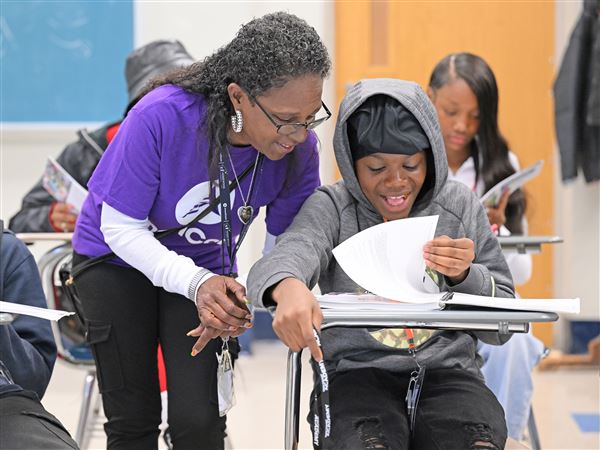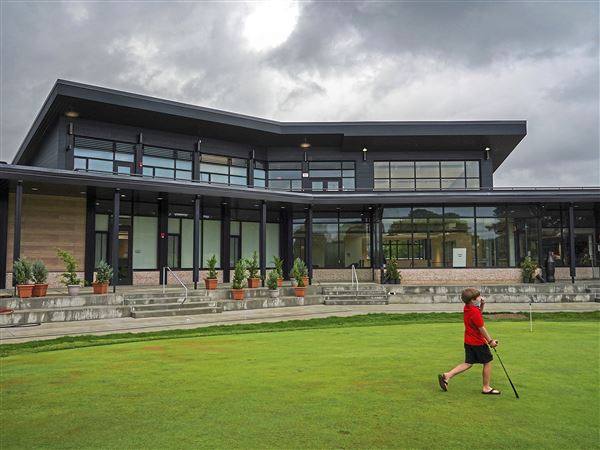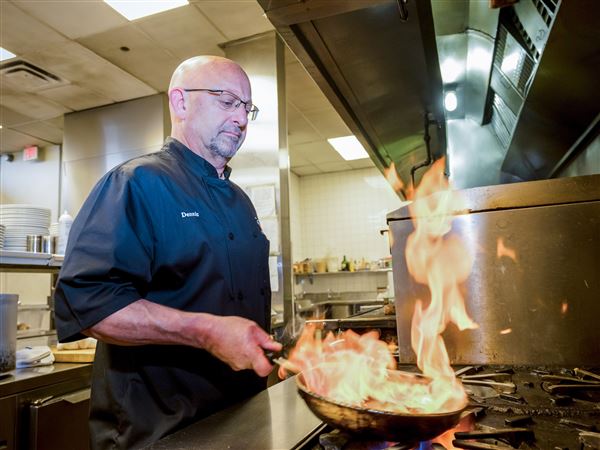With a plastic spoon in his mouth, kindergartner Nathan Thrower tried to say "cat."
"What do you think he just said?" Cris Jackson asked the four other children in his group.
They shrugged.
"It's hard to understand him with a spoon in his mouth," acknowledged Jackson, one of several parents volunteering for the day at South Butler Primary School in Clinton. "How do you think it would be if we sounded like this all the time?"
It would be hard. And getting the school's 800 kindergartners through third-graders to understand that is the point of the Ability Discovery Workshop.
South Butler Primary school parents Chris Weber and Michelle Ciora created the workshop with the support of Principal Greg Hajek. The idea is to simulate what it's like to have speech impediments, visual impairments, motor difficulties, sensory aversions and hearing impairments.
"My goal is that [our pupils] will treat every child or adult with a disability with appropriate actions," Hajek said. "We want to make them aware that there are other people with differences and celebrate that.
"We're not developing sympathy, we're developing empathy, and there's a big difference between those two words. So rather than stressing disability awareness, we're calling it 'Ability Awareness.' "
In developing the workshop, which will expose all of South Butler Primary's pupils to the experience of having ability impairments, Ciora and Weber had lofty goals.
"We all have people in our lives -- who are dear to us -- with disabilities," said Ciora, "and I've seen them go out into the world and be treated improperly, insensitively, and sometimes they're taken advantage of.
"I think it's a matter of ignorance, and it's important to educate children to grow up to become respectful, kind, loving adults for people of every ability."
Weber's son, Alex, 9, has Down syndrome. He and Ciora's son, Rick, 7, are close friends.
The two second-graders served as guinea pigs as their mothers developed and tested the props and equipment for the workshop.
"With their exposure to Alex, the kids in his class are sensitive to his abilities without even being aware of it," said Weber. "It's lovely to see how they interact with him, and their teacher promotes those friendships."
"The purpose of the workshop is to reach the children who haven't had the luxury of being exposed to a child with compromised abilities," added Ciora. And even for children who do have such exposure and awareness, the workshop gives experience with a variety of challenges, and furthers their understanding of what life may be like for their friends.
Tina Zacherl's kindergarten class -- which includes 6-year-old Michael Lawton, who also has Down syndrome -- was first to experience the hands-on workshops Wednesday.
"I gave the kids a brief overview before coming here," said Zacherl, "and they were curious. I can't wait to see their reactions."
The workshop, which will be presented throughout the month, incorporates five different stations manned by parent volunteers. The intent is to start a dialogue between pupils and adults about what it's like to have differing abilities.
In the physical station, the children touring the workshop put on thick gloves and tried to pick up small objects: marbles, coins, pencils, buttons. "How do you think it would be if it was this hard to pick up something all of the time?" volunteer Pam Sharbaugh asked them. "Do you think you might get frustrated?"
The questioning then turned to prompting the children to think about what they could do to when they encounter someone who has motor disabilities. "If someone is having trouble doing something, what do you think we should do? Should we offer to help them?"
The children invariably said they would help, but parents made it clear that insisting on helping such a person would be inappropriate.
"Everyone likes to do things for themselves, but it is good to help someone when they want and need it," the parents told them.
The vision station was equipped with glasses that had scuffed lenses, and children were asked to identify pictures through the haze. "If someone always has trouble seeing things, should they tell someone?" volunteer Sandy Kalmar asked the group. "Who should they tell?"
The children offered suggestions: Mom, Dad, Grandma, a teacher. And Kalmar added that it's also helpful to tell their peers about their difficulties "because we all have special abilities and things we can't do."
At the hearing station, volunteer Beth Harper played a tape recording in which words were muffled. She then asked the children to guess at what was being said. "How do you think it would be if it was this hard to hear something all of the time?"
Harper said this particular activity was especially well received by the older children, who recognized that people close to them, such as grandparents, have trouble hearing.
"The younger kids thought it was a big game," said Harper, "but the second-graders began talking about older people with hearing aids and how they know they need to speak loudly when talking to them.
"I could see that many of them suddenly realized what it might be like for someone who can't hear very well, and I was very impressed that all of the children had heard of sign language."
The last station incorporated a box filled with different objects that the children couldn't see. They were instructed to stick their hands into the box while parents Laurie Gialanella and Kathy Lawton talked to them about their reactions.
"Did anything you touched feel strange? Did it make you feel a little bit uncomfortable?"
The children reacted with varying degrees of fear and curiosity -- and one little boy was delighted to imagine that one of the objects he had touched was brains.
"Some of the girls didn't want to put their hands in the box," said Gialenella.
The idea was to help children deal with their fear of the unknown -- a factor in dealing with people with disabilities.
It also helps them to know that they aren't hurt by touching things they can't see. "We can't catch someone else's difficulty or disability," Lawton said.
At his previous school in Parma, Ohio, Hajek was director of special education. This is his second year as principal of South Butler Primary.
He wants to establish ability awareness as a tradition at the school. "At this age, [teaching acceptance] is important because the children come with a clean slate, and it's a perfect time to instill that openness to differences," he said.
"The focus is on awareness and developing a sensitivity to people who are different. In the real world you'll come across people with differences in how they look, and kids will give others a chance, not label them or limit them by what they physically see."
First Published: January 18, 2004, 5:00 a.m.











